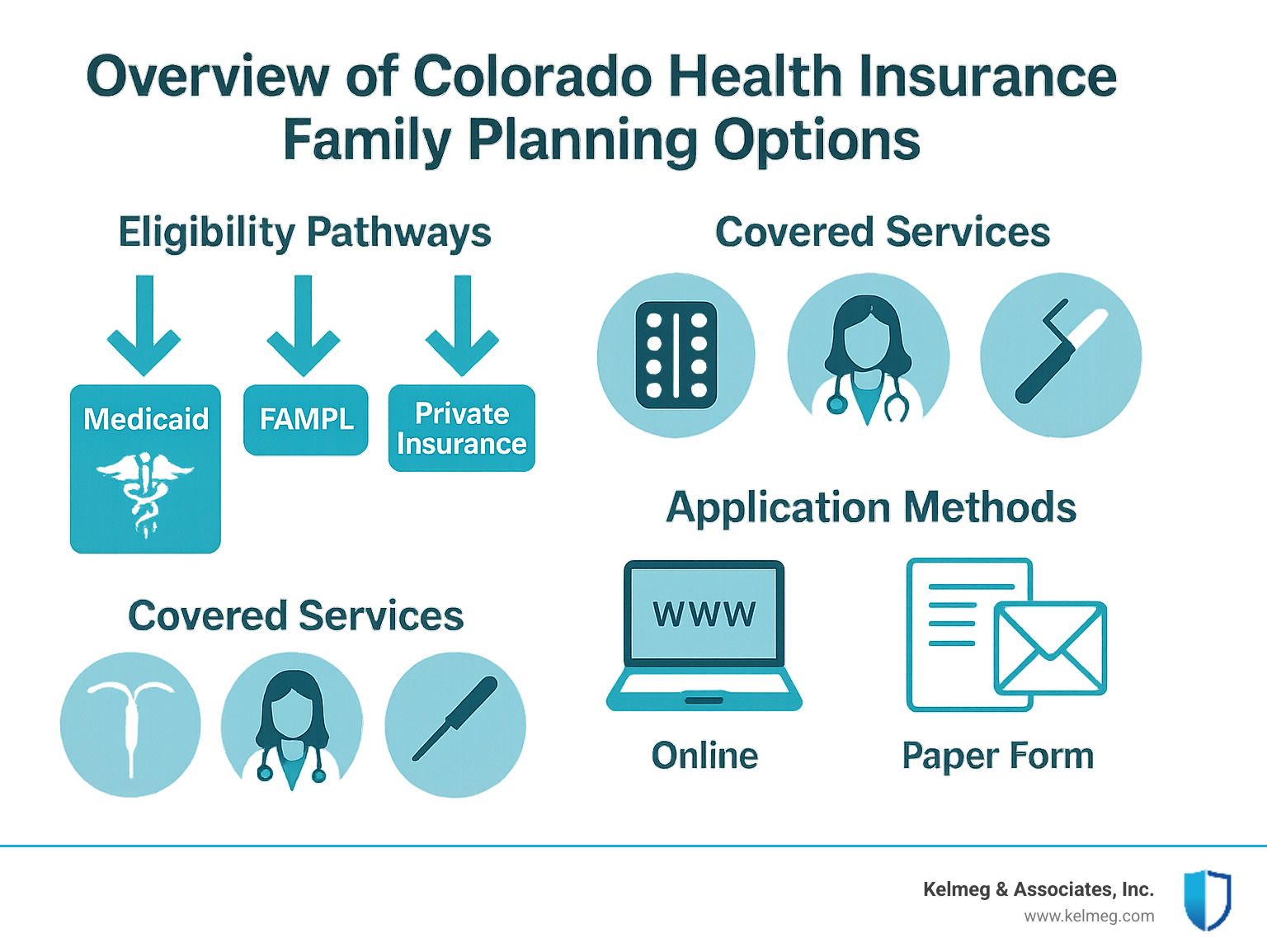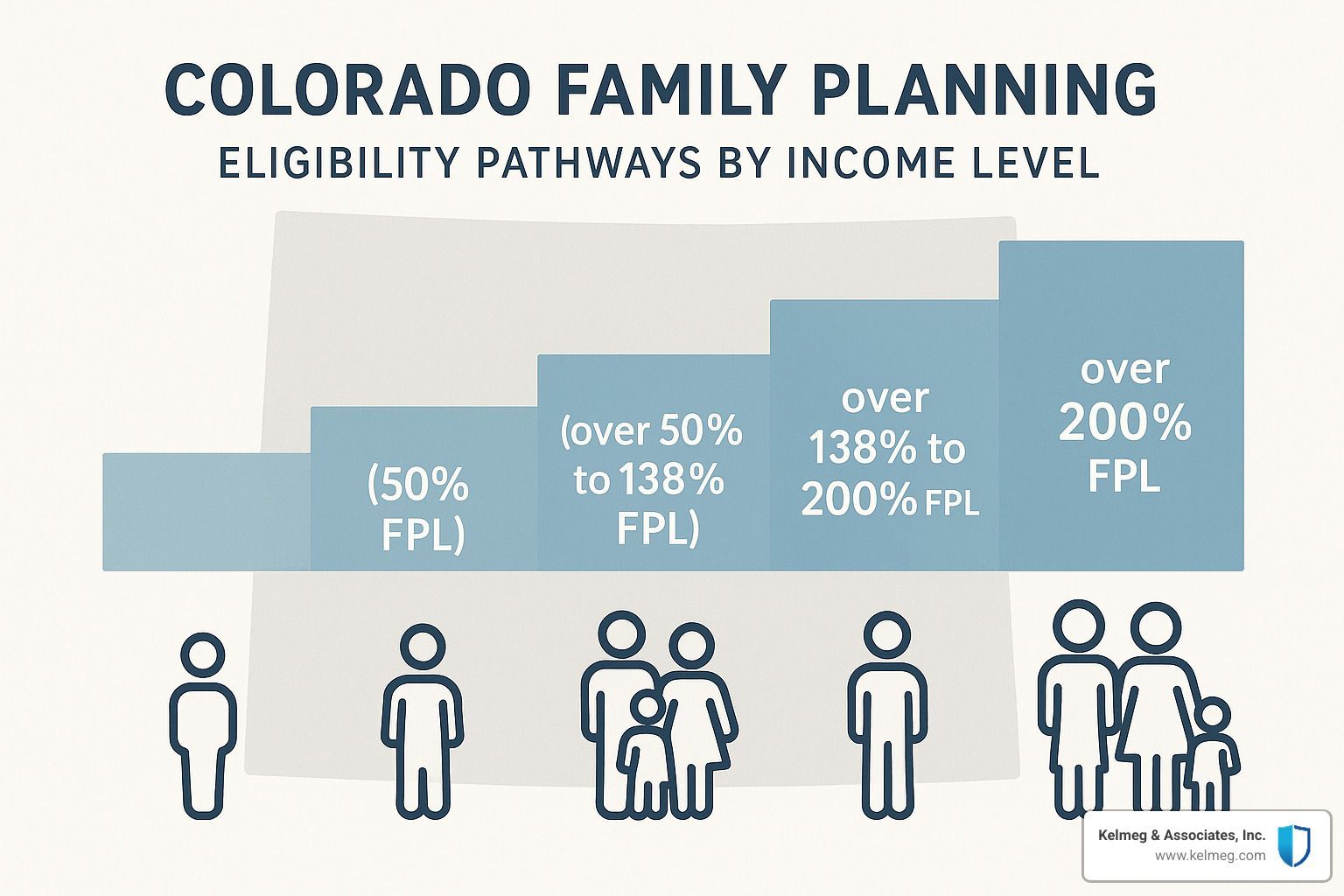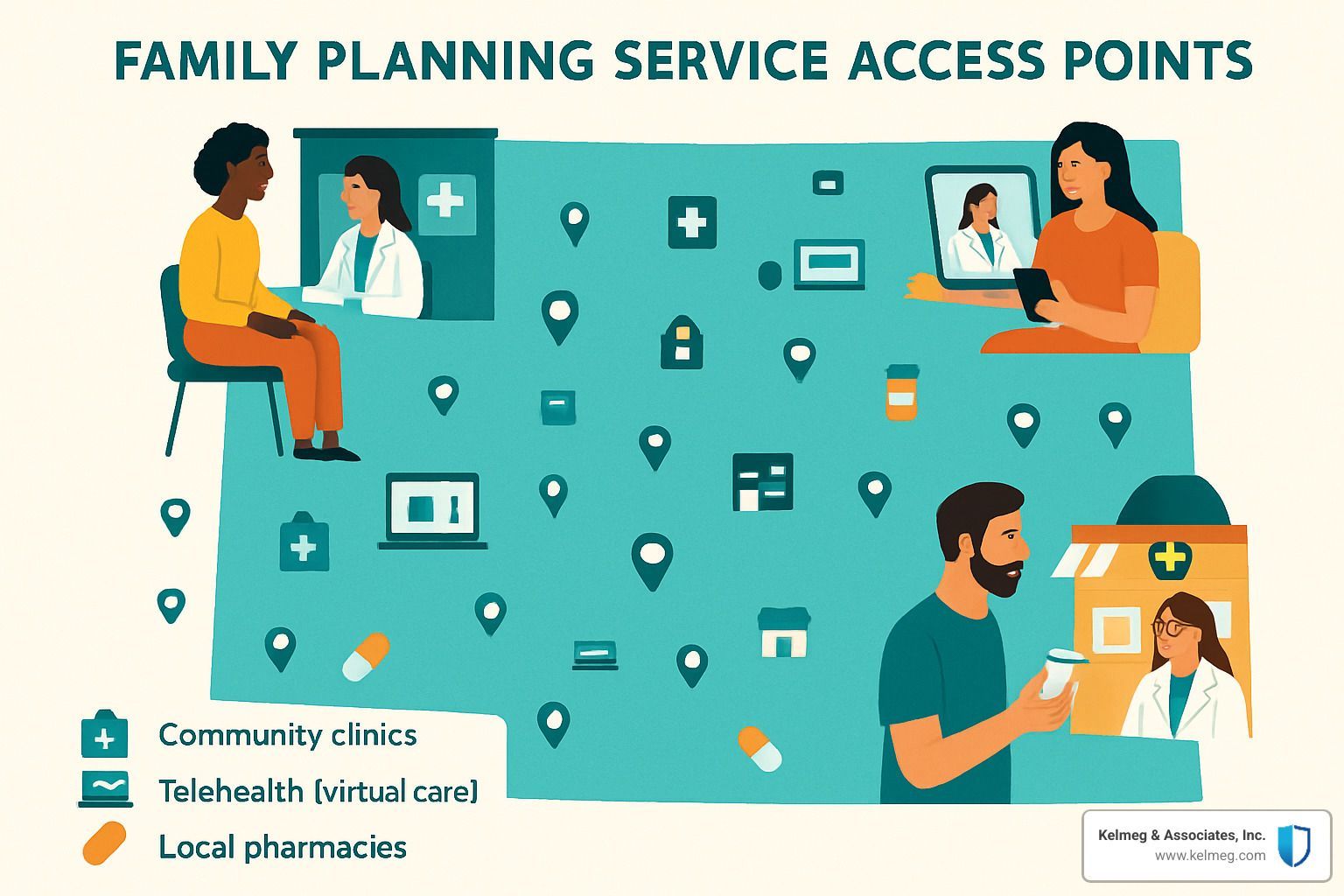Family Planning in Colorado – Navigating Health Insurance Options
Understanding Your Family Planning Insurance Options in Colorado
Colorado health insurance family planning options provide comprehensive coverage for reproductive health services regardless of your income level or immigration status.
Finding the right family planning coverage shouldn't be complicated. Colorado offers multiple pathways to access these essential services, with many options available at no cost.
I'm Kelsey Mackley, an insurance specialist at Kelmeg & Associates, Inc., where I help individuals and families steer colorado health insurance family planning options to find coverage that matches their unique needs. My expertise in both private and public insurance programs ensures you'll understand all your options without the confusion that often surrounds health insurance decisions.

Colorado Health Insurance Family Planning Basics
When folks ask me about colorado health insurance family planning, I often say Colorado stands as a bright spot on the map. Our state has acceptd some truly forward-thinking policies that make reproductive health services accessible to everyone – regardless of what's in your wallet or where you were born.
Your Colorado health plan (whether it's Medicaid, FAMPL, or a private plan) typically covers a wonderful range of family planning services. These include contraception counseling, yearly wellness check-ups, STI screening and treatment, sterilization options for adults 21+, basic fertility testing, and comprehensive postpartum care that now extends for a full year after giving birth. The best part? These preventive services come with zero out-of-pocket costs.
The impact of these policies speaks volumes. Colorado's investment in accessible contraception has led to dramatic drops in unintended pregnancies across the state, particularly among younger women. As Colorado's Family Planning Program beautifully puts it: "Our goal is to improve reproductive health access and outcomes by ensuring all Coloradans have access to affordable, quality, patient-centered reproductive health services."
What Family Planning Services Are Covered?
When it comes to colorado health insurance family planning, the contraceptive coverage is impressively comprehensive. If you're enrolled in Health First Colorado (our state's Medicaid program) or the Family Planning Limited benefit plan, you'll have access to all FDA-approved birth control methods without paying a penny in copayments.
This includes daily birth control pills (and yes, you can get up to a 12-month supply at once!), long-lasting options like IUDs and implants, injectable contraceptives, patches, rings, emergency contraception, and barrier methods like diaphragms and condoms. For those who've completed their family planning journey, surgical sterilization is also covered for clients 21 and older.
I recently spoke with Maria, a Denver resident who just enrolled in Health First Colorado. She was genuinely surprised to learn she could get a full year's supply of birth control pills in one go. "It's made managing my reproductive health so much easier," she told me, "especially with my crazy work schedule."
If you have private insurance instead, good news – plans sold in Colorado must also cover contraceptive methods and counseling as preventive care with no cost-sharing, though specific brands and types might vary depending on your plan.
Beyond Birth Control: Fertility & Wellness Benefits
Family planning is about so much more than preventing pregnancy, and colorado health insurance family planning benefits reflect this holistic approach.
On the fertility front, both Health First Colorado and Family Planning Limited benefits include basic fertility assessments and counseling to help you understand your reproductive health. It's important to note, though, that while assessment is covered, treatment for infertility causes generally isn't included under these programs. Private insurance coverage for fertility treatments varies widely – some Colorado employers offer robust fertility benefits, but our state laws don't currently mandate coverage for all fertility treatments.
Your wellness benefits extend beautifully beyond contraception. All plans cover preventive services related to reproductive health with no copay, including annual well-woman exams, cervical cancer screenings (Pap tests), breast cancer screenings, STI and HIV testing, gynecological exams, and HPV vaccination.
Starting December 1, 2024, Health First Colorado will expand coverage to include lactation support services for eligible members. These services will be available both in-person and via telehealth, with options for individual or group settings. For pregnant Medicaid members, Colorado now covers doula services too – up to 180 minutes of prenatal and postpartum support, plus one labor visit per 12-month period.
As Dr. Sarah Johnson, a family planning specialist in Boulder, shared with me recently: "We've seen how comprehensive wellness services improve health outcomes. When patients have access to the full spectrum of reproductive healthcare, they're empowered to make the best decisions for their health and future."
For more information about the science behind contraception efficacy, visit the Healthcare.gov preventive care benefits page.
Eligibility & Program Options in Colorado
Colorado offers multiple pathways to access family planning services, with eligibility determined primarily by income, immigration status, and in some cases, pregnancy status. Understanding these options is crucial for finding the right coverage for your needs.

Health First Colorado Full-Benefit Coverage
Health First Colorado (Colorado's Medicaid program) provides comprehensive coverage for family planning and reproductive health services. When you qualify for full Medicaid benefits, you gain access to a complete range of reproductive healthcare with zero out-of-pocket costs.
Qualifying for Health First Colorado is primarily income-based. Adults with income up to 133% of the Federal Poverty Level can receive coverage, while pregnant women qualify with income up to 195% FPL. Families with children and young adults under 19 have more generous income limits, qualifying with family income up to 260% FPL.
The benefits package is impressive – all FDA-approved contraceptive methods with no copay, annual family planning visits, STI testing and treatment, sterilization procedures if you're 21 or older, basic fertility assessments, and comprehensive pregnancy care.
One of the most significant recent improvements is the expanded postpartum coverage. Since July 2022, new mothers receive a full 12 months of coverage after pregnancy ends – a huge extension from the previous 60-day limit. To access this extended coverage, simply report your pregnancy through your PEAK account, the Health First Colorado mobile app, or by contacting your county human services department.
"When our daughter was born last year, knowing we had a full year of postpartum coverage gave us peace of mind," shares Lucia from Adams County. "I was able to address my postpartum depression and receive lactation support without worrying about losing coverage. My husband James and I couldn't be more grateful."
Family Planning Limited (133-260% FPL)
What happens if you earn too much for Medicaid but still need affordable family planning services? That's where the Family Planning Limited (FAMPL) benefit plan comes in – a wonderful option that many Coloradans don't even know exists.
FAMPL bridges an important gap for those with income between 133% and 260% of the Federal Poverty Level. There are no age or gender restrictions – you simply need to be a Colorado resident and not otherwise eligible for full Medicaid benefits.
The beauty of FAMPL is that it provides identical family planning services to full Medicaid with no copays. You'll receive the same contraception options, sterilization procedures, basic fertility assessment, and STI testing when provided as part of a family planning visit.
Perhaps the most helpful feature of FAMPL is presumptive eligibility, which means you can receive immediate coverage on the day you apply while your full application is being processed. No waiting periods or coverage gaps!
Carlos from Broomfield experienced this firsthand: "The FAMPL program filled a crucial gap for me when I started a new job that didn't offer health benefits right away. I was able to continue my reproductive health care without interruption, even though my income had increased beyond Medicaid limits."
EMS & Undocumented Access
Colorado health insurance family planning options extend to everyone who calls our state home, regardless of immigration status. This inclusive approach represents Colorado's commitment to ensuring reproductive healthcare access for all residents.
Since July 2022, the Emergency Medicaid Services (EMS) program in Colorado expanded to cover family planning and related services for individuals who don't meet citizenship requirements but satisfy all other Medicaid eligibility criteria.
If you're undocumented but meet income requirements and live in Colorado, you can access the same comprehensive family planning services as other Medicaid members with no copays. The application process is confidential, and no Social Security number is required.
"This expansion has been life-changing for many families in our community," explains Maria Rodriguez, a healthcare navigator in Lafayette. "I've helped numerous individuals access essential services who previously had nowhere to turn. The relief on their faces when they learn they qualify is something I'll never forget."
The application process mirrors other Medicaid programs, and you can visit any enrolled provider. This program has been particularly valuable for mixed-status families and individuals new to Colorado who are establishing their lives here.
Private & Marketplace Plans
For Coloradans who don't qualify for public programs or prefer private insurance, strong protections exist for colorado health insurance family planning coverage.
Thanks to the Affordable Care Act, all private health insurance plans sold in Colorado must cover preventive services without cost-sharing. This includes all FDA-approved contraceptive methods (though specific brands may vary), annual well-woman visits, STI screening, and breast and cervical cancer screening.
Starting in 2023, Colorado introduced standardized health plans through the Colorado Option that include comprehensive reproductive health benefits with predictable costs. These plans are available through Connect for Health Colorado, the state's health insurance marketplace.
For undocumented residents, Colorado's innovative OmniSalud program provides a path to purchase private health insurance with subsidies through a separate platform within Connect for Health Colorado – another example of the state's commitment to universal access.
Most employer plans must also comply with ACA preventive care requirements, though some religious employers may qualify for exemptions from contraceptive coverage.
"The landscape of private insurance can be confusing," acknowledges Tom Wilson, an insurance specialist at Kelmeg & Associates in Boulder. "We help clients understand exactly what's covered in their plan and how to maximize their family planning benefits. Everyone deserves to know their options without getting lost in insurance jargon."
Applying, Costs, and Provider Access
Navigating the application process for colorado health insurance family planning services doesn't have to be complicated. I've helped hundreds of Colorado families through this journey, and I promise—it's simpler than it looks!
Step-by-Step: Medicaid / FAMPL / EMS Applications
When you're ready to apply for Health First Colorado (Medicaid), Family Planning Limited (FAMPL), or Emergency Medicaid Services (EMS), you'll follow the same straightforward process:
The easiest way is through PEAK—Colorado's online portal. Just visit CO.gov/PEAK, create your account, and follow the prompts. The system will ask about your household size, income, and citizenship status. Be honest about your status—remember, EMS coverage is available regardless of immigration status.
"I was nervous about applying online," shares Maria from Longmont, "but the PEAK system walked me through each step. I had my approval within two weeks!"
Not comfortable with online applications? No problem! You can also apply:
- By phone at 1-800-221-3943 where friendly staff will guide you
- In person at your local county human services office
- By mail by downloading an application from CO.gov/HCPF
For FAMPL applicants, there's a wonderful benefit called presumptive eligibility. This means you can receive coverage immediately while your full application is being processed—no waiting period for essential services.
Don't forget to gather some basic documents before applying: proof of identity, income verification, and Colorado residency documentation. If you're pregnant and seeking extended postpartum coverage, you'll need to verify your pregnancy too.
One thing I love about Colorado's approach to family planning: there are no age restrictions or parental notification requirements. This ensures everyone can access confidential care when they need it.
Marketplace Enrollment & Financial Help
Looking for private insurance through Connect for Health Colorado? Timing matters!
The main Open Enrollment period runs from November 1, 2024, through January 15, 2025. Mark your calendar if you want coverage starting January 1! But life doesn't always follow a schedule, which is why Special Enrollment Periods exist year-round for qualifying events like losing other coverage, getting married, having a baby, moving to Colorado, or experiencing income changes.
The financial help available through the marketplace can be truly life-changing. Premium tax credits reduce your monthly premium costs, while cost-sharing reductions on Silver plans can significantly lower your deductibles and copays if your income is below 250% of the Federal Poverty Level.
The application process is straightforward: visit ConnectforHealthCO.com, create an account, enter your household details, and compare plans side by side. Pay special attention to each plan's family planning coverage details—they can vary.
I recently helped a teacher in Fort Collins find a plan that saved her nearly $200 monthly on premiums while maintaining access to her preferred OB/GYN. These savings add up quickly!
Need help comparing plans? That's exactly what we do at Kelmeg & Associates—at no extra cost to you. You'll pay the same premium whether you use our services or not, so why steer these waters alone? More info about Individual plans
Using Your Benefits
Once you're enrolled, making the most of your colorado health insurance family planning benefits is the next step.
Finding the right provider is easy. If you're on Health First Colorado or FAMPL, you can see any enrolled provider for family planning services—no referrals needed, even for specialists. The Find a Doctor tool on HealthFirstColorado.com helps locate providers who accept your coverage.
Colorado's pharmacy benefits for contraception are among the best in the nation. State law requires insurance to cover up to a 12-month supply of contraceptives at once—that's right, a full year's supply in one visit! This is incredibly convenient, especially for those with busy schedules or transportation challenges.
"Getting a year's supply of my birth control pills changed everything," says Amara from Denver. "No more monthly pharmacy trips, no more worrying about refills when traveling. It's one less thing to stress about."
Telehealth has revolutionized access to family planning services. Virtual visits for contraceptive counseling are covered, and many plans offer $0 copay telehealth specifically for family planning services. Starting December 2024, Health First Colorado will even cover lactation support via telehealth—a game-changer for new parents.
Privacy matters in healthcare, and Colorado takes this seriously. If you're on a family plan but want communications about your family planning services kept private, you can request that insurance statements be sent to an alternate address. This protection is especially important for dependents on family plans who may want confidential care.
Understanding your benefits isn't just about knowing what's covered—it's about using those benefits effectively to take control of your reproductive health. We're always here to help you steer these options and find what works best for your unique situation.
Frequently Asked Questions about Colorado Health Insurance Family Planning
What birth control methods can I get at no cost in Colorado?
If you're wondering about free birth control options in Colorado, you're in luck! The state offers some of the most comprehensive contraceptive coverage in the nation.
Under Health First Colorado (Medicaid) and the Family Planning Limited (FAMPL) programs, you can access all FDA-approved contraceptive methods without paying a single penny out of pocket. This includes everything from daily birth control pills to long-lasting options like IUDs and implants that work for years. You're also covered for hormonal methods like patches, rings, and injections, as well as barrier methods like diaphragms and condoms.
"I was amazed when I found out I could get an IUD completely free through my Health First Colorado coverage," shares Denise from Fort Collins. "It's given me peace of mind for five years now, with no worries about refills or daily pills."
Even emergency contraception and sterilization procedures (if you're 21 or older) are covered at no cost. And thanks to Colorado's forward-thinking laws, you can get up to a 12-month supply of birth control at once – no more monthly pharmacy trips!
If you have private insurance, the good news continues. All ACA-compliant plans must cover FDA-approved contraceptive methods without cost-sharing. While the specific brands might vary between plans, your insurance must cover at least one form of each contraceptive method at no cost to you.
Can undocumented Coloradans receive family planning services?
Yes! Colorado has made significant strides to ensure that colorado health insurance family planning services are accessible to everyone, regardless of immigration status.
Since July 2022, Colorado's Emergency Medicaid Services (EMS) program has covered comprehensive family planning services for folks who don't meet citizenship requirements but satisfy other Medicaid eligibility criteria. The application doesn't require a Social Security number, and your information remains confidential.
The innovative OmniSalud Program offers another pathway, allowing undocumented Coloradans to purchase subsidized private health insurance through a separate platform within Connect for Health Colorado.
For immediate needs, approximately 80 clinics participating in Colorado's Family Planning Program offer services on a sliding fee scale regardless of immigration status. Their motto is simple: no one gets turned away for inability to pay.
Maria, a community health worker in Pueblo, shares: "I've seen how these programs have transformed access for undocumented families. People who previously avoided healthcare altogether are now getting regular reproductive health services without fear."
The Cover All Coloradans Initiative takes things a step further by extending Medicaid-like benefits to pregnant people and children regardless of immigration status, ensuring that everyone has access to essential care.
How do fertility assessments differ from infertility treatment coverage?
This is where colorado health insurance family planning coverage gets a bit tricky, and understanding the difference can save you from unexpected costs.
Fertility assessments are generally covered by most insurance plans, including Health First Colorado and FAMPL. These assessments include basic evaluations of your fertility status, counseling about factors affecting fertility, screenings for conditions that might impact your ability to conceive, education about optimal timing for conception, and basic fertility-related lab work.
Thomas and Elena from Colorado Springs found this distinction crucial: "We were able to get initial testing through our insurance to understand why we weren't conceiving. While it didn't cover treatment, it helped us make informed decisions about next steps."
Infertility treatments, on the other hand, have more limited coverage. Advanced reproductive technologies like in vitro fertilization (IVF) are generally not covered by Health First Colorado or FAMPL. While treatment for underlying conditions causing infertility may be covered as medical treatment, the coverage specifically for fertility purposes is often limited.
Private insurance coverage for infertility treatments varies widely by plan. Some employers offer improved fertility benefits beyond what's legally required, so it's worth checking your specific plan details or talking with your HR department.
Unlike some other states, Colorado doesn't currently have a state mandate requiring private insurers to cover infertility treatments. This makes it especially important to review your plan documents carefully or speak with a knowledgeable insurance broker who can help you understand your specific coverage.
At Kelmeg & Associates, we're happy to help you steer these distinctions and find the best coverage for your reproductive health needs – at no extra cost to you.
Conclusion
Navigating colorado health insurance family planning options might seem complicated at first, but Colorado has truly created a system where everyone can find coverage that fits their needs. Whether you're looking at Medicaid, specialized programs for higher incomes, services for those with different immigration statuses, or private insurance – there's a path forward for you.
I've worked with hundreds of Colorado families, and I've seen how these programs can provide not just coverage, but peace of mind. When Elena from Lafayette finded she qualified for Family Planning Limited benefits despite her income being too high for full Medicaid, she told me, "I finally feel like I can make decisions about my future without worrying about the cost."
Here's what I hope you'll take away from this guide:
Colorado has eliminated traditional barriers to reproductive healthcare. Your age, gender, or immigration status won't prevent you from accessing essential family planning services. The recent expansions to include 12-month postpartum coverage, family planning for undocumented residents, and added benefits like doula and lactation support show Colorado's commitment to comprehensive reproductive health.
Most importantly, many of these services come with no copays or cost-sharing – particularly under public programs and for preventive care under private insurance. That means you can focus on what's right for your health rather than worrying about your wallet.
At Kelmeg & Associates, we understand that family planning decisions are deeply personal. Finding coverage that respects your choices while meeting your needs is essential. Our team across Boulder, Lafayette, Broomfield, and Adams County is ready to help you steer these options – and our guidance comes at no additional cost to you.
"Health insurance shouldn't be a puzzle you have to solve alone," says Kelsey Mackley, our founder at Kelmeg & Associates. "We're here to help Colorado families understand all their options so they can make confident decisions about their reproductive health."
Take the next step today. Whether you need help understanding if you qualify for Medicaid, want to explore Family Planning Limited benefits, or need guidance on private insurance options, we're here to provide personalized support that puts your needs first. Your reproductive health journey deserves care and attention – and so do you.














